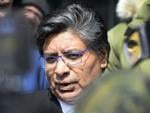MONTREAL—The life of a “co-operating witness” is dangerous — especially if you’re double-crossing a drug cartel.
It’s a choice that takes bravery, desperation, fear — even stupidity. If all goes well, you might walk away into witness protection. If not, you may be dead.
Enter Jonathan Acebedo Garcia, a dual Canadian-Colombian citizen who went by the nickname Jon. He grew up in Montreal, but by his late 20s was bouncing around in the United States, appearing to live the life of a low-level drug dealer. Once, a state trooper stopped him for speeding in upstate New York and found 23,000 ecstasy pills. That landed him behind bars for four years. And it was there, in a Texas prison, sometime around 2011, that he befriended a fellow Canadian — the former Olympian Ryan Wedding, who is now at the centre of a massive international manhunt and the subject of a $15-million reward.
As part of its ongoing investigation into the ex-snowboarder’s alleged criminal network, the Star has reviewed hundreds of pages of court documents to offer the clearest picture yet of how authorities cracked down on the so-called “Wedding DTO” — an organization accused of ordering dozens of murders to protect a trafficking route that shipped hundreds of millions of dollars of cocaine into Canada.
The documents offer a rare glimpse not only into the role of the confidential witness but also into the drug-trafficking conspiracy in which he was embedded. The case illustrates the complexity and sophistication of the cross-border drug trade, from meticulous planning to international criminal networks and the use of encrypted communications to elude law enforcement.
As the FBI tells it, Wedding was the head of the snake, operating out of Mexico. Acebedo Garcia’s role was twofold: First, he arranged the delivery of cocaine to middlemen in the U.S. — the network’s “couriers” — and then by truck to Wedding’s buyers in Canada. Second, he’d launder the proceeds back to Wedding in Mexico.
This story, which details Acebedo Garcia’s role in the downfall of the Wedding drug network, is based on claims and allegations contained within a series of documents that have not yet been tested in court.
The story of Jonathan Acebedo Garcia
Public records reveal little about Acebedo Garcia as a person — a man with a modest home, small businesses and a criminal record ranging from petty theft to trafficking. But speaking to those who knew him well, some who love and miss him deeply, he’s much more complicated, someone one friend described as “an enigma.”
The Star spoke with some of his friends, former business associates and family members. None agreed to identify themselves out of fear for their safety, knowing Wedding is still at large. One common theme emerged: Acebedo Garcia lived a double life. If he was trafficking drugs and laundering money, those closest to him didn’t know about it — or at least, the extent of it.
Acebedo Garcia grew up in Montreal with his three siblings: one brother and two sisters. He spoke Spanish, French and English. He graduated from a Montreal high school in 1999 and went to college to study tourism, though he never completed his degree.
In his mid-20s, Acebedo Garcia was charged in Quebec with theft and fraud offences. He pleaded guilty to the former charge and was sentenced to a $500 fine and two years of unsupervised probation.
His arrest in New York came a year later, in 2009, over what court records describe as a large-scale drug-trafficking operation focused on smuggling narcotics from Canada into the U.S. He pleaded guilty to one count of conspiracy to traffic drugs and was sentenced to a little more than four years in prison. This is how he met Wedding.
What exactly led Wedding and Acebedo Garcia to hit it off is unclear, but the FBI alleges this was the beginning of a long and fruitful working relationship. After Wedding’s release, the stakes of his operation grew exponentially.
The Montreal bar Jonathan Acebedo Garcia used to help run, listed for sale earlier this year.
Calvi Leon/Toronto Star
While working for the ex-athlete, Acebedo Garcia owned or operated multiple Quebec businesses: a gas station in Laval, a car detailing company and a small neighbourhood bar in Montreal’s north end.
The space sat empty one day this fall. Inside, old arcade games, a pool table and a digital jukebox. Tucked behind the counter, a poster quoting a line from the iconic gangster film “The Godfather.” When the Star asked the only bartender on shift if he knew Acebedo Garcia and recognized his photograph, the man nodded but indicated he had nothing more to say.
The businesses don’t appear to have been particularly lucrative ventures. If he was making a lot of money from a life of crime, Acebedo Garcia wasn’t advertising it.
Acebedo Garcia lived with his wife and kids in a bungalow on a quiet residential street in Terrebonne, an off-island suburb north of Montreal. A couple nearby said they found him to be unfriendly, unlike his parents, who lived there before him. Between throwing pool parties and driving motorcycles, he’d developed a reputation as the noisy neighbour.
He was a “secretive” individual with a serious demeanour, said one friend who knew him for more than a decade. He described Acebedo Garcia as “sporty,” often rocking new shoes, Adidas pants and a fanny pack across his body; he walked with a distinctive, confident stride.
The pair bonded over their love of cars and being fathers. Acebedo Garcia was proud to have kids, the man said.
The friend was aware there was another side — one that involved Acebedo Garcia’s time in prison — but said he never asked questions.
“What was in the back of the curtain, I don’t know,” he said.
The deal with the FBI
Inside the FBI, Special Agent Hannah Monroe was the woman tasked with taking on Ryan Wedding. She joined the FBI in 2014 and is a specialist in cross-border investigations — drug trafficking, computer crimes and financial fraud.
Over the years, Monroe investigated other plots to export cocaine from California to Canada, including one case that allegedly involved a cross-border shipment of Starbucks cheese Danishes — an alleged “dry run” to ship cocaine on the return leg to Ontario.
It’s not clear who was behind that operation, but the logistics of the Wedding scheme were much the same. Obtain incredible quantities of drugs sourced from Colombia via Mexico’s notorious Sinaloa Cartel. Ship it to Southern California. Then on to Canada by truck.

Jonathan Acebedo Garcia, in a social media photo.
Facebook
In the summer of 2023, Monroe approached RCMP Staff Sgt. Stephen MacQueen. The 24-year veteran, who has extensive experience in covert operations, was posted as a liaison officer in Los Angeles. (Once, as a young constable posted to Salisbury, N.B., he was awarded the Governor General’s Medal of Bravery for his actions in arresting a “deranged and suicidal” armed man at a gas station.)
It’s clear from the timeline that the FBI were already zeroing in on a serious drug network — but didn’t have enough to bring it down. They needed help inside Canada.
In late 2023, Acebedo Garcia met with Monroe at an unknown location to cut a deal. The task was to get the Montrealer on board to record messages and attend meetings with Wedding’s crew at various locations around the globe.
MacQueen would be the RCMP “cover person” assigned to control and direct Acebedo Garcia while in Canada and outside of FBI jurisdiction.
There’s no single answer as to why individuals agree to become informants or CWs, said Alexandra Natapoff, a law professor at Harvard University and expert on criminal informants.
In many cases, she said, these individuals may not have any choice at all — they may not know their rights, nor be well versed in the legal system. “They may very well be alone, facing a police officer, arrest or incarceration, or further punishment in ways that feel like inexorable pressure is being put on them to co-operate,” said Natapoff, the author of “Snitching: Criminal Informants and the Erosion of American Justice.”
Other times, those who cut deals with law enforcement are powerful, well-represented individuals — from Wall Street brokers to political operatives and drug cartel members.
Acebedo Garcia agreed to work with authorities “in the hope of receiving consideration in any charging decisions” related to his role in the Wedding DTO, court documents say. The documents don’t reveal what that “consideration” might have looked like.

A reward poster for the arrest of Ryan Wedding, seen at a Department of Justice news conference on Wednesday.
Andrew Harnik/Getty Images
How to double-cross a drug cartel
In January 2024, Acebedo Garcia flew to Mexico City to meet in person with Wedding and Andrew Clark, Wedding’s alleged right-hand man. From the moment Acebedo Garcia landed, the FBI was watching from a distance.
First, Acebedo Garcia met Clark at a high-end restaurant bar in Polanco, an affluent neighbourhood in the western part of the city that’s popular for its upscale shopping. Two days later, they would meet again — this time at a Starbucks close to Acebedo Garcia’s hotel. And with Wedding there.
The conversations appeared to have centred on logistics. In one recording, detailed in the documents, the FBI claims Clark told Acebedo Garcia that Wedding would transport up to 350 kilos of cocaine at a time.
Clark, who handled the organization’s drug distribution in Canada, allegedly explained this meant between 2,000 and 3,000 kilos of cocaine would be crossing the border each month.

Gurpreet Singh, left, and Hardeep Ratte.
Ontario Superior Court Exhibit
Clark and Wedding directed Acebedo Garcia to negotiate a haulage deal with an uncle and nephew duo with access to a GTA-based trucking network.
Later, over the encrypted messaging app Threema, Clark directed Acebedo Garcia to offer a flat rate of $220,000 a load.
The two men, Gurpreet Singh and his uncle Hardeep Ratte, allegedly agreed to the deal weeks later in yet another meeting, in Ontario this time.
By early March 2024, the plan was in motion. Wedding began messaging details of the first shipment for delivery out of Los Angeles — 293 kilos of cocaine stored in 20 boxes. Acebedo Garcia relayed the information to Singh and Ratte in a group chat titled “Family Group.”
On March 3, Ratte said he was sending a courier to L.A. “As soon (as) he lands I will send u info,” he said. “I just need then to make sure my guys safety that’s theres no tail.”
He was right to be cautious — FBI agents were tracking their every move.
That same day, Singh sent Acebedo Garcia a message with his courier’s contact info and name — “John” — along with a serial number from a dollar bill they’d use to verify his identity.
Taking orders from the FBI, Acebedo Garcia gave this information to Wedding but replaced John’s phone number with a new one assigned to a cellphone that U.S. authorities could monitor.
On March 4, the two couriers met at a distribution centre off a highway in San Bernardino, Calif. As they moved boxes from one vehicle to the next, undercover agents were stationed on the ground; others watched via “an airship with high-definition cameras.”
When all was complete, Wedding received and then sent Acebedo Garcia a screenshot of a message: “Listo boss entrengada la encomlenda (sic) de 293,” which translates as: “Done boss delivered the order of 293.”
U.S. authorities had seen it all, but they didn’t jump in to make arrests or seize the drugs. Not right away. The probe was just getting started.
The case against Ryan Wedding
A week later, Acebedo Garcia would be in Dubai.
Singh was staying at the “Palm” — a likely reference to one of Dubai’s many luxury hotels — and suggested Acebedo Garcia stay there too. Prosecutors have accused Singh of having access to “a sophisticated organized crime network in Dubai.”
Monroe and other agents travelled with Acebedo Garcia, but the FBI could not obtain legal permission in Dubai to record the meeting on March 11. Monroe instead debriefed with Acebedo Garcia after the conversation.
By early April, authorities say Singh and Ratte agreed to organize a second shipment into Canada.
Just like the first time, Acebedo Garcia swapped one courier’s phone number for another before sending it to Wedding. And just like the first time, everything seemed to go without a hitch.
Only this time, when the two couriers met in Riverside, Calif., on April 9, the authorities descended. As soon as the men secured the boxes, agents swooped in and arrested them on the spot. A total of 334 kilos was seized from one vehicle. Another 41 kilos were found in the other.
Later that night, Wedding’s courier told an officer he was being paid $17,000. He’d been on the job for just two months.

Wedding competed for Canada in snowboarding at the Salt Lake City Winter Olympic Games.
Adam Pretty/Getty Images
Meanwhile, the higher-ups were worried.
“I think their guy showed up with a tail and got busted,” Wedding messaged Acebedo Garcia after he couldn’t reach his courier by phone.
While the bust was a blow to the group, court records suggest it had little effect on the overall operation. The couriers, to them, were disposable. And within days, the co-conspirators were plotting their next shipment.
By June 2024, Acebedo Garcia’s work had paid off: Investigators had what they needed to lay charges against Clark and Wedding.
Just as law enforcement authorities were preparing to execute arrests in multiple countries, Acebedo Garcia was planning to get out of Canada.
That summer, he shipped a 2011 Harley-Davidson and a Jet Ski trailer with two Sea-Doos from his Quebec home to an apartment building in the La Florida neighbourhood of Medellin, Colombia. By the fall, he had opened a short-term rental company there.
Back in Montreal, the longtime friend who spoke to the Star was hearing all about Acebedo Garcia’s luxury life, from fancy cars to his “beautiful house” in the Colombian mountainside — a castlelike mansion with tennis and basketball courts, the friend said, referencing pictures he’d seen.
The last time they spoke on the phone, the friend said Acebedo Garcia told him, “I can’t come back to Canada anymore.” It was too risky.
Why exactly Garcia relocated to Medellin, the historical heart of Colombia’s cocaine country, is unclear. It’s also unknown whether or not he was offered any protection from the FBI.
Confidential witnesses “risk their well-being, their health, even their lives,” Natapoff, the Harvard law professor, noted. Routinely, she said, there are stories in which law enforcement fails to protect informants — by making their identities known, or by exposing them to dangerous situations for which they are not prepared.
In October 2024, the FBI held a news conference to announce the results of the years-long probe: Sixteen people — 10 Canadians — facing charges ranging from conspiracy to import cocaine to murder in furtherance of a criminal enterprise.
Wedding and Clark, authorities claimed, led a sophisticated drug trafficking organization that deployed hit men to execute rivals or enemies.
Wedding and Clark are also accused of directing the killings of a Brampton man in May 2024; Clark and another Canadian, Malik Cunningham, 24, are separately charged in the April 1 killing of a Niagara man.
Clark was arrested in Mexico last year, but Wedding is still at large. He is believed to be hiding in Mexico under the protection of cartels.
When the case was first announced, prosecutors indicated their star witness — whose identity was long undisclosed in these legal documents — was expected to testify at trial.
Not long after, in a Toronto court, it was revealed that this was no longer the case.
“We were advised that there’s been a change of plans,” lawyer Peter Thorning said at a Toronto extradition hearing for his then-client, Singh. “The central witness would no longer be testifying at trial,” Thorning said, relaying news he’d received from Crown prosecutors.
“There is no explanation as to why.”
The revelation left lawyers, media, and observers dumbfounded. Why was the witness no longer testifying? What did it mean for the prosecution?
What the court did not hear that day was that a month earlier, on Jan. 31, the FBI’s witness had been assassinated in Medellin, Colombia; he was shot five times in the head.
His name, the Star would soon report, was Jonathan Acebedo Garcia.
- The plot to assassinate Jonathan Acebedo Garcia.
- The role of the lawyer who allegedly told Wedding that killing Acebedo Garcia would scuttle the case.
- The rise and fall of one of Wedding’s alleged hit men …
- … and the story of the man he was allegedly contracted to kill.
- And one victim’s message to the man accused of ordering her innocent parents’ murders.













